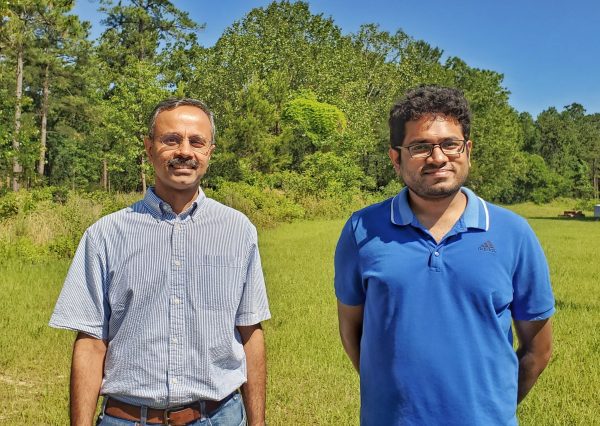Collaboration and Innovation

When Srinivas Akella, computer science professor at UNC Charlotte’s College of Computing and Informatics (CCI) attended a recent NextGen Air Transportation (NGAT) workshop, he hadn’t expected to leave with an opportunity to work with a team from UNC Wilmington, but the best collaborations often take root during chance meetings of innovative people with complimentary interests. The workshop, sponsored by the North Carolina Department of Transportation (NCDOT), drew Akella, in part, because of the work he has done with the North Carolina State Highway Patrol (NCHP) using drones to speed the investigation of crash reconstruction in low-light conditions. Akella’s work helped reduce average reconstruction times from 90 minutes to less than half an hour, saving money and making roadways safer for drivers and investigators. Now, all 21 NCSHP accident reconstruction units are equipped with the system Akella helped develop. During a break between sessions at the workshop, Akella met Britton Braxley, a student working with UNCW associate professor of geography Narcisa Pricope studying the advancement of an invasive marsh reed species in coastal North Carolina. The offending reed, Phragmites australis, is problematic because it crowds out native plants. “[Braxley] indicated that our work would be very relevant to their mapping applications, and so I reached out to Dr. Pricope,” Akella says. “At CCI, we have been developing algorithms for line coverage of environmental features such as roads, rivers and power lines,” Akella says. “Our research is on the development of algorithms for multiple robot coordination, and we are always on the lookout for interesting and useful applications for our algorithms and software.” Together, Akella and Pricope applied for a UNC System Inter-Institutional Planning Grant and earned $75,000 to fund the project. The researchers will produce high-resolution maps that show the spread of the invasive reed, which will enable regulatory agencies to focus on areas of rapid progression, Pricope said. “This will be one of the first high-resolution maps of these invasive species in New Hanover County and beyond,” she said. “By flying multiple drones in tandem and linking the data to satellite imagery, we should be able to show where the reed is expanding the fastest.” The project will depend on successfully incorporating an algorithm developed by Akella and his Ph.D. student, Saurav Agarwal (pictured together), that can program two or more quadrocopter drones to fly together. Linking two drones, or UAVs (Unmanned Aerial Vehicles), to gather the same data sets enables researchers to map large areas under identical environmental conditions and improve accuracy. “There are a number of challenges to be addressed,” says Agarwal, “to make this work.” Using multiple drones to simultaneously gather data, the drones need to work in concert, flying together in pre-programmed patterns to produce a seamless map of an area too large for a single drone to cover in a single flight. “To be time efficient,” Agarwal says, “we must program highly-efficient flight patterns that do not overlap or repeat. Imagine coming up with the most-efficient pattern to mow a lawn shaped like the state of Texas without ever mowing the same spot twice.” The team’s research received endorsements from the NC Department of Transportation and the NC Coastal Federation, and one of the UNC System’s goals is for researchers to use the planning funds to harness additional external funding. As drone studies, particularly of large geographic areas, become increasingly ubiquitous, this collaboration could revolutionize how real-time data is collected to better understand natural disasters, wild fires and storms. “Performing post-storm damage assessment and recovery can be expedited by using drones to inspect rivers and roads and detect impassable areas,” Akella says. “This approach makes inspections less hazardous for first responders.” This work highlights the innovative, collaborative work being conducted at CCI, which is preparing to celebrate its 20th anniversary as a College within UNC Charlotte. The fastest-growing College in the 17-institution UNC System, CCI is a tech leader today and poised to set the course for the future of tech in Charlotte, the Carolinas and beyond. *UNC Wilmington Communications contributed to this story For More News, Notes and Updates, Follow CCI on TWITTER.